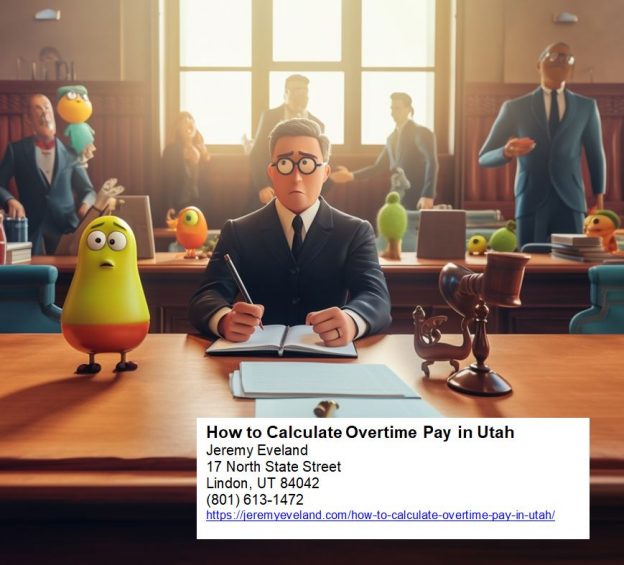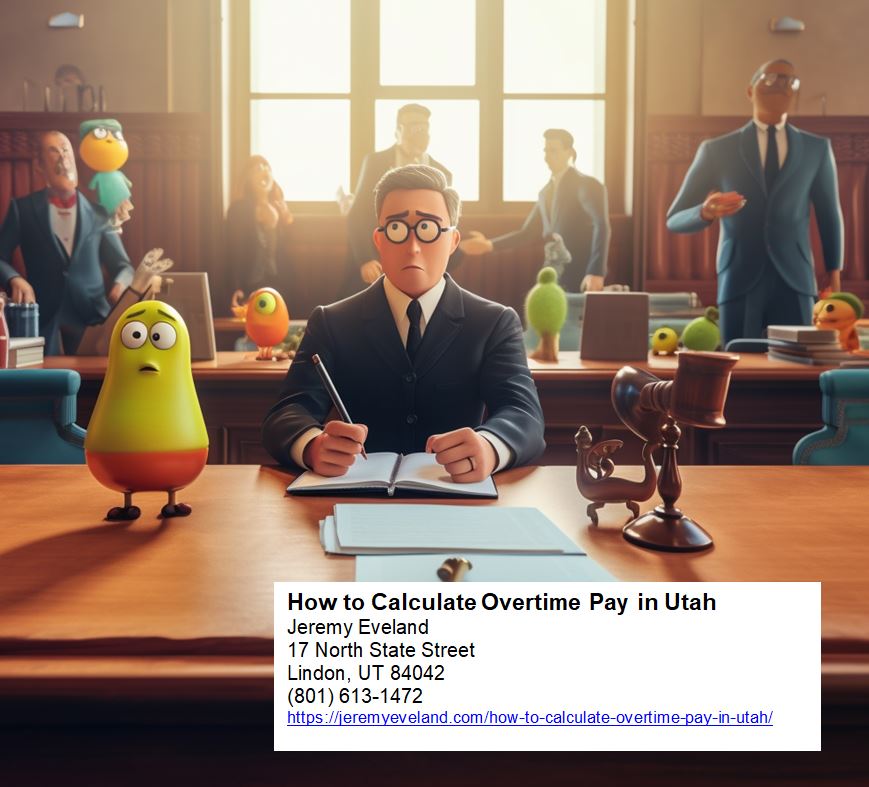Understanding Utah's Labor Laws
Navigating the maze of Utah's labor laws might seem like trying to decipher an alien language. It's complex, full of legal nuances that are easy to overlook and can carry hefty consequences if you inadvertently step out of line. But don't worry, you're not alone in this journey. Whether you're a business owner or an employer seeking clarity on these statutes, it's crucial to understand the rules that govern your operations and protect both your interests and those of your employees.
As you delve into the labyrinthine world of Utah labor law, a seasoned business lawyer will be your guide through its winding corridors. Their expertise extends beyond mere legal representation – they interpret these intricate regulations for you, ensuring your company remains within bounds while avoiding potential liabilities and legal complications. This article serves as a primer on understanding Utah's labor laws, turning what may initially appear as impenetrable legalese into comprehensible information that empowers you in managing your workforce according to state regulations. Let's dive straight into uncovering the mysteries surrounding minimum wage regulations, overtime pay requirements, employee rights and protections among other aspects central to Utah's labor landscape.
Key Takeaways
- Utah's minimum wage is set at $7.25 per hour, with exceptions for certain employees.
- Overtime pay is required for employees who work more than 40 hours in a workweek, calculated at one and a half times the regular rate of pay.
- Utah's labor laws include provisions for employee rights and protections, such as the Equal Pay Act and whistleblower protection.
- Employers in Utah have obligations under OSHA regulations to ensure workplace safety and minimize or eliminate hazards.
Minimum Wage Regulations in Utah
When you're navigating the labyrinth of Utah's labor laws, it's crucial to have a seasoned business lawyer by your side who knows the ins and outs of minimum wage regulations as deftly as Daedalus knew his own maze. Understanding minimum wage standards in Utah is fundamental for any business owner or employer looking to stay compliant and avoid potential legal issues. As per the Utah Labor Commission, the current state minimum wage matches that of the federal rate set at $7.25 per hour. However, there are certain exceptions where this may not apply such as for tipped employees, full-time students, or workers with disabilities.
Utah labor laws also stipulate how wages should be paid and when. The law requires employers to pay their employees at least semimonthly, but more frequent payments are permissible as well. Moreover, if an employee quits or is terminated from employment without notice, all outstanding wages must be paid within 24 hours after demand for payment has been made. This knowledge is essential in preventing possible conflicts between you and your employees over compensation matters.
Moreover, it's important to note that while there's a federal provision allowing young workers under 20 years old to be paid less than the minimum wage during their first 90 consecutive calendar days of employment with an employer – called a training wage – this does not exist under Utah law. Therefore, regardless of age or experience level every employee must receive at least the prescribed state and federal minimum wage unless one of the aforementioned exceptions applies.
Getting familiar with these nuances about wages in Utah laws can help shield your business from costly litigation and sanctions from regulatory bodies like the Utah Labor Commission. After understanding these basics about regular pay scales under Utah labor laws, it's time now to delve further into another critical aspect: overtime pay requirements; because knowing when you're required to provide additional compensation can save you headaches down the line.
Overtime Pay Requirements
You'll definitely want to master the ins and outs of overtime pay requirements in the Beehive State. As a business owner or employer, understanding Utah's labor laws can help you avoid any legal pitfalls that may arise from non-compliance. The Fair Labor Standards Act (FLSA) governs the rules for overtime pay on a federal level, but each state can have its own regulations. In Utah, if an employee works more than 40 hours in a workweek, they are entitled to overtime pay at a rate of one and one-half times their regular rate of pay.
Here is a simple breakdown:
| Aspect | Definition | Example |
|---|---|---|
| Regular Rate of Pay | This is usually the hourly wage an employee receives for their standard hours worked. | If your regular wage is $10/hr, then this is your regular rate of pay. |
| Overtime Hours | Any hours worked over 40 in a single work week. | If you work 45 hours in one week, you have 5 hours of overtime. |
| Overtime Pay Rate | This should be one and half times the regular rate of pay. | Using our previous example, your overtime rate would be $15/hr ($10 * 1.5) |
It's crucial that you know how to calculate these correctly under Utah law to ensure fair wages are being paid out and all obligations under labor laws are met.
Now that we've covered minimum wage regulations and overtime pay requirements in Utah, it's time to delve into employee rights and protections further. Don't overlook this area as it contains essential information about how employees should be treated within your organization according to Utah law. This will not only keep you compliant but also foster a healthier workplace environment which benefits everyone involved!
Next up: 'Employee Rights and Protections'. Get ready to explore more about what this means for both employers and employees alike.
Employee Rights and Protections
Let's dive into the crucial topic of employee rights and protections, a cornerstone for fostering a robust work environment that respects every individual's dignity. Understanding Utah's labor laws is integral to ensuring your company adheres to these regulations, which are in place to safeguard employees' welfare. These laws cover a broad spectrum of issues from employment discrimination to whistleblower protection. By hiring a seasoned business attorney in Utah, you can better navigate these complex legal terrains, allowing you to focus more on growing your business while being confident that your practices align with state and federal legislation.
One cannot overstate the importance of understanding the Equal Pay Act as part of Utah's labor laws. This act ensures fair pay policies within businesses by prohibiting wage discrimination based on sex – men and women must receive equal pay for substantially similar work. Not only does this promote fairness in the workplace but it also encourages an inclusive environment where employees feel valued, leading to increased productivity levels.
- The Equal Pay Act covers:
- Wage disparities: Employers must not pay different wages based on gender for equivalent work.
- Job content: The law considers job content—not job titles—when determining if jobs are substantially equal.
- Exceptions: Only seniority systems, merit systems or systems measuring earnings by quantity or quality can justify pay differences between genders.
Whistleblower protection is another key aspect under Utah's labor laws that requires attention. Employees should be able to report illegal activities without fear of retaliation from their employers. By knowing and enforcing these rights and protections, you create an open culture where employees feel safe enough to voice concerns about unethical activities occurring within the organization.
The landscape of employee rights and protections is extensive under Utah's labor laws; thus far we've discussed just two out of many facets—Equal Pay Act and Whistleblower Protection—but there are undoubtedly more areas requiring careful navigation such as employment discrimination cases. Engaging a competent business lawyer will ensure adherence while providing much-needed guidance through their expertise in local labor laws. Now it's time we delve deeper into one critical area that significantly impacts any workplace- discrimination laws in the workplace—which forms yet another layer in our exploration of Utah's diverse labor legislation landscape.
Discrimination Laws in the Workplace
Navigating the murky waters of workplace discrimination laws isn't just a necessity—it's an art that can shape your business's soul, painting a picture of fairness, respect and equality. As an employer in Utah, it's imperative to understand discrimination laws in the workplace so you can ensure that every employee feels valued and protected. This not only creates a harmonious working environment but also safeguards your business from potential lawsuits or penalties for non-compliance with Utah's labor laws.
Discrimination at work is unlawful under Title VII of the Civil Rights Act 1964 and various state-level regulations. This means employers cannot discriminate against employees based on their race, color, religion, sex (including pregnancy), national origin, age (40 or older), disability or genetic information. These rights extend to all aspects of employment including hiring practices, wage decisions, promotions or terminations. Understanding these rights as a part of Utah's labor laws helps maintain ethical standards while also preventing potentially damaging legal action.
In addition to federal mandates, Utah has its own anti-discrimination statute—the Utah Antidiscrimination Act—that provides additional protections for employees. It prohibits employers with 15 or more workers from discriminating on bases similar to those outlined in Title VII and includes sexual orientation and gender identity as protected classes. The law applies across all stages of employment—from recruitment through termination—and violations could result in severe penalties such as fines or injunctions.
Being well-versed with these discrimination laws is crucial for safe navigation within the legal landscape; however equally important is understanding other facets like break time requirements which influence daily operations significantly. So let's now shift our focus towards comprehending how these are structured within Utah's framework.
Understanding Break Time Requirements
Break time rules in the workplace aren't just about clock-watching—they're a crucial part of employment law that can significantly impact your business's daily operations and overall morale. As an employer, it's essential for you to understand Utah's labor laws concerning break times. The state mandates specific requirements for breaks, particularly meal periods and rest breaks, which are enforced by the Department of Labor. Being aware of these stipulations not only protects you from potential legal disputes but also ensures that your employees' welfare is prioritized.
In Utah, according to the Utah Code, employers are not required to provide breaks to employees aged 18 years or older. However, if they do decide to offer short rest periods (usually lasting around 5-20 minutes), those breaks must be counted as paid work time. This rule applies whether your business operates from Salt Lake City to St George or anywhere else within the Beehive State.
The situation changes slightly when it comes to meal periods though. If an employee works through their designated meal period—typically lasting at least 30 minutes—they should be compensated as per regular working hours unless they are completely relieved of duty during that time frame. It's important for you as an employer to clarify this with your workers because any misunderstanding can lead to conflicts.
Understanding Utah's labor laws regarding break time requirements is critical for maintaining a harmonious and productive work environment while ensuring compliance with state regulations. As we move forward on this journey of understanding Utah's Labor Laws, let us delve deeper into safety and health standards—the cornerstone of every successful business operation—which acts as another protective layer safeguarding both employers and employees alike.
Safety and Health Standards
Just as a sturdy helmet defends a cyclist from potential accidents, adhering to stringent safety and health standards shields your business from unforeseen legal troubles. When it comes to occupational safety, Utah's labor laws are in line with the federal Occupational Safety and Health Administration (OSHA) regulations. These guidelines ensure you provide a safe working environment for your employees that is free of known dangers. As an employer or business owner, understanding these safety and health standards isn't just about compliance; it's also about fostering a culture of safety at the workplace.
The first step towards ensuring occupational safety under Utah's labor laws is recognizing hazards that could potentially cause harm or discomfort to your employees. This includes everything from heavy machinery operation risks in manufacturing plants to ergonomic issues in an office setting. It's essential for you to conduct regular risk assessments and implement measures designed to minimize or completely eliminate these risks. Remember, OSHA requires employers not only identify but also communicate these potential dangers clearly to all employees.
Utah employers have specific obligations directed by the OSHA standards which include providing necessary personal protective equipment (PPE), maintaining accurate records of work-related injuries and illnesses, providing medical examinations when required, and regularly training employees on how to prevent accidents at the workplace. Violations can lead not only hefty penalties but may damage your reputation as well. Proper adherence ensures you're protecting both your workers' welfare and your business interests.
Maintaining high workplace safety standards isn't simply about avoiding fines—it's also an investment into productivity and morale of your workforce. Your commitment towards their well-being will be reciprocated with loyalty, reduced absenteeism due to illness or injury, and increased output—contributing positively towards overall company performance. Now that we've covered how crucial it is for businesses operating in Utah adhere strictly adhere to the state's occupational health & safety guidelines let's move onto another key aspect governed by Utah's labor laws: employee benefits and leave policies.
Employee Benefits and Leave Policies
Beyond the grind of daily tasks and responsibilities, it's essential to consider your employees' need for rest and recuperation, which often comes in the form of benefits and leave policies. Utah doesn't have any state-specific laws regarding paid vacation or sick leave, but many employers choose to offer these as part of their employee benefits package. However, if you decide to provide these benefits, you must adhere to the promises made in your company policies or employment contracts. It's also important to remember that federal law may require you to offer certain types of leaves.
In addition to standard vacation and sick days, there are several other types of leave that might be relevant for your business:
- Family and Medical Leave Act (FMLA): This act requires covered employers to provide up to 12 weeks of unpaid leave each year for specified family and medical reasons.
- Health Reimbursement Arrangement (HRA): A type of account-based health plan that allows employers to reimburse employees tax-free for qualified medical expenses.
- Military Leave: Federal law provides certain protections for employees who serve in the military.
- Jury Duty: Utah law prohibits employers from penalizing employees who miss work because they are serving on a jury.
Understanding these various leave policies can feel daunting at times. That's why it's wise to consult with a knowledgeable business lawyer who is well-versed in both Utah labor laws and federal requirements. They can help guide you through the intricacies of FMLA compliance, health reimbursement arrangements, military leave statutes, among others.
While balancing employee needs with legal obligations can seem challenging at first glance, taking the time now will save headaches down the road. Up next: familiarizing yourself with your obligations related to compliance reporting – an essential aspect of running a successful business while adhering strictly by all labor laws applicable in Utah.
Compliance and Reporting Obligations
Beyond understanding the various benefits and leave policies, it's equally critical for you as a business owner to grasp your compliance and reporting obligations under Utah's labor laws. This involves staying abreast of both federal and state statutes that govern your operations, safeguarding not only your interests but also those of your employees. Aligning with these requirements ensures you avoid costly penalties and legal issues that could potentially disrupt or even cripple your business.
Utah's labor laws demand employers comply with specific reporting duties to ensure the rights of workers are upheld. These requirements range from maintaining accurate records of hours worked and wages paid to promptly responding to wage claims or complaints about workplace safety. In some cases, you may also need to report about layoffs or plant closures under the Worker Adjustment and Retraining Notification (WARN) Act if applicable.
| Federal Law | State Law | |
|---|---|---|
| Record Keeping | Employers must maintain accurate records of employees' pay, hours worked, deductions, etc., for three years | Utah law similarly requires employers keep such records for one year |
| Wage Claims | Employers must respond promptly to wage claims made by employees | Utah law has strict requirements on how employers should handle wage claims |
| Workplace Safety | OSHA mandates regular reporting on workplace safety incidents | The Labor Commission oversees workplace safety in Utah; any accidents must be reported within four days |
| Layoffs/Closures | WARN Act requires notification in case of large-scale layoffs or plant closures | While there is no specific state law mirroring the WARN Act, other regulations might apply depending upon circumstances |
It's clear that compliance with these reporting obligations can be complex due to the overlapping nature of federal and state laws. Thus, retaining a competent business lawyer who understands Utah's labor laws becomes invaluable. They can guide you through this maze ensuring you fulfill all required duties while focusing on what matters most – growing your thriving enterprise.
Frequently Asked Questions
What are some common legal issues a business lawyer can help Utah businesses navigate outside of labor laws?
Beyond labor laws, a business lawyer can be your trusted ally in navigating many other legal issues that often arise in the Utah business environment. They can help you deal with matters related to commercial real estate such as lease agreements and property disputes. If you're dealing with contractual issues, they'll aid in drafting, reviewing, and enforcing contracts to ensure your interests are protected. Tax law is another area where their expertise will prove invaluable; they'll guide you on how to remain compliant with Utah's complex tax codes while maximizing your financial efficiency. Furthermore, if you're considering expanding or restructuring your business, they can provide sound advice on merger and acquisition processes or bankruptcy proceedings. So remember, hiring a business lawyer isn't just about labor laws – it's about ensuring every aspect of your business runs smoothly within the confines of the law.
How can a business lawyer help in drafting and reviewing contracts or business agreements in Utah?
Did you know that nearly 60% of all business-related disputes arise from poorly drafted or misunderstood contracts? This is where a competent Utah business lawyer can be invaluable. They'll not only draft your contracts but also meticulously review them to ensure they're legally sound and protect your interests. Utilizing their in-depth knowledge of both Utah's regulations and federal laws, these professionals will craft agreements that safeguard you against potential legal complications. Whether it's employment contracts, business partnerships, or buy-sell agreements, your attorney will work diligently to make sure every detail aligns with your objectives while also maintaining full legal compliance. So when it comes to drafting and reviewing contracts in Utah, having a seasoned business lawyer by your side isn't just a good idea—it's essential for the stability and prosperity of your enterprise.
What role does a business lawyer play in managing business disputes and litigation in Utah?
A business lawyer plays an indispensable role in managing your business disputes and litigation in Utah. They serve as your company's advocate, representing you with expertise and tenacity when conflicts arise. Whether it's a disagreement with a supplier, customer, or another entity, your lawyer investigates the situation meticulously to protect your interests. They skillfully navigate through complex commercial laws, ensuring compliance while fighting for the best outcome. In case of potential lawsuits, they can help mitigate risks by crafting strategic defenses or pursuing aggressive negotiations to resolve issues before reaching courtrooms. Their comprehensive knowledge of Utah's labor laws also aids in settling employment-related disputes fairly and efficiently. So remember – having a competent business lawyer at your side isn't just about legal guidance; it's about ensuring the survival and prosperity of your business amidst challenges.
How can a business lawyer assist Utah businesses in understanding and adhering to environmental regulations?
Imagine you're steering a ship through turbulent waters, with hidden rocks and treacherous currents lurking beneath the surface. That's what it feels like to navigate Utah's complex environmental regulations without expert guidance. A savvy business lawyer is your experienced skipper in this scenario, equipped with an in-depth understanding of Utah's specific laws and how they apply to your business operations. They'll keep you compliant by deciphering intricate legal jargon for you, helping you avoid hefty fines or damaging lawsuits that could result from non-compliance. They can also guide you through the process of securing necessary permits, ensuring your operations are environmentally sound while protecting your bottom line. So let a business lawyer be your compass in these unstable waters; their expertise will ensure smooth sailing through the complexities of Utah's environmental regulations.
Can a business lawyer help Utah businesses with transactions, mergers, and acquisitions?
Absolutely, a business lawyer can be instrumental in guiding you through all matters of transactions, mergers, and acquisitions. They'll offer valuable insights into due diligence processes, contract negotiations, regulatory compliance, and asset valuation. With their assistance, you'll be able to navigate complex legal landscapes with confidence and conduct these high-stakes operations in a manner that protects your interests. Not only will they help ensure each transaction is legally sound, but they'll also strategize to maximize your financial benefits while minimizing risks. So yes, employing a business lawyer for transactions, mergers and acquisitions can provide Utah businesses with an indispensable edge.
Areas We Serve
We serve individuals and businesses in the following locations:
Salt Lake City Utah
West Valley City Utah
Provo Utah
West Jordan Utah
Orem Utah
Sandy Utah
Ogden Utah
St. George Utah
Layton Utah
South Jordan Utah
Lehi Utah
Millcreek Utah
Taylorsville Utah
Logan Utah
Murray Utah
Draper Utah
Bountiful Utah
Riverton Utah
Herriman Utah
Spanish Fork Utah
Roy Utah
Pleasant Grove Utah
Kearns Utah
Tooele Utah
Cottonwood Heights Utah
Midvale Utah
Springville Utah
Eagle Mountain Utah
Cedar City Utah
Kaysville Utah
Clearfield Utah
Holladay Utah
American Fork Utah
Syracuse Utah
Saratoga Springs Utah
Magna Utah
Washington Utah
South Salt Lake Utah
Farmington Utah
Clinton Utah
North Salt Lake Utah
Payson Utah
North Ogden Utah
Brigham City Utah
Highland Utah
Centerville Utah
Hurricane Utah
South Ogden Utah
Heber Utah
West Haven Utah
Bluffdale Utah
Santaquin Utah
Smithfield Utah
Woods Cross Utah
Grantsville Utah
Lindon Utah
North Logan Utah
West Point Utah
Vernal Utah
Alpine Utah
Cedar Hills Utah
Pleasant View Utah
Mapleton Utah
Stansbury Par Utah
Washington Terrace Utah
Riverdale Utah
Hooper Utah
Tremonton Utah
Ivins Utah
Park City Utah
Price Utah
Hyrum Utah
Summit Park Utah
Salem Utah
Richfield Utah
Santa Clara Utah
Providence Utah
South Weber Utah
Vineyard Utah
Ephraim Utah
Roosevelt Utah
Farr West Utah
Plain City Utah
Nibley Utah
Enoch Utah
Harrisville Utah
Snyderville Utah
Fruit Heights Utah
Nephi Utah
White City Utah
West Bountiful Utah
Sunset Utah
Moab Utah
Midway Utah
Perry Utah
Kanab Utah
Hyde Park Utah
Silver Summit Utah
La Verkin Utah
Morgan Utah
Understanding Utah’s Labor Laws Consultation
When you need help from Corporate Counsel in Utah, call Jeremy D. Eveland, MBA, JD (801) 613-1472 for a consultation.
Jeremy Eveland
17 North State Street
Lindon UT 84042
(801) 613-1472
Related Posts
Business Lawyer Cottonwood Heights Utah
Understanding Utah’s Consumer Protection Laws
Comprehensive Guide To Hiring A Business Lawyer
Business Lawyer Springville Utah
Mergers and Acquisitions from a Legal Perspective
Business Lawyer Eagle Mountain Utah
Understanding Anti-Trust Laws in Utah
Business Lawyer Cedar City Utah
Understanding LLC Laws in Utah
Business Lawyer Kaysville Utah
Understanding Utah’s Non-Profit Laws
Business Lawyer Clearfield Utah
Business Lawyer American Fork Utah
How To Handle Customer Complaints In Utah
Business Lawyer Saratoga Springs Utah
The Role of Business Law in Protecting Minority Shareholder Rights
What Are The 4 Different Types of Business Law?
Business Lawyer Washington Utah
Business Lawyer South Salt Lake Utah
Legal Requirements for Utah Technology Startups
Business Lawyer Farmington Utah

















